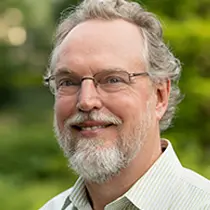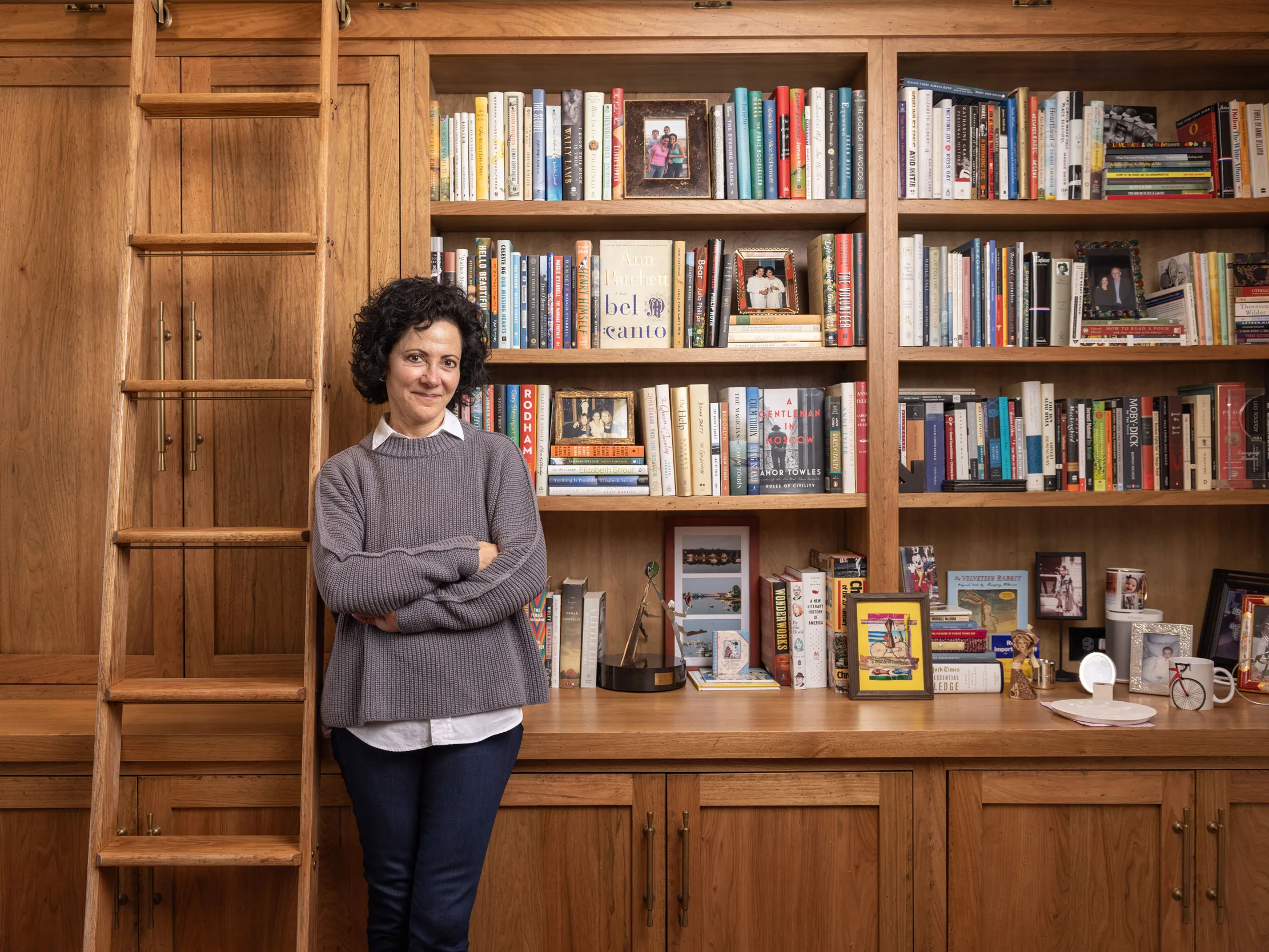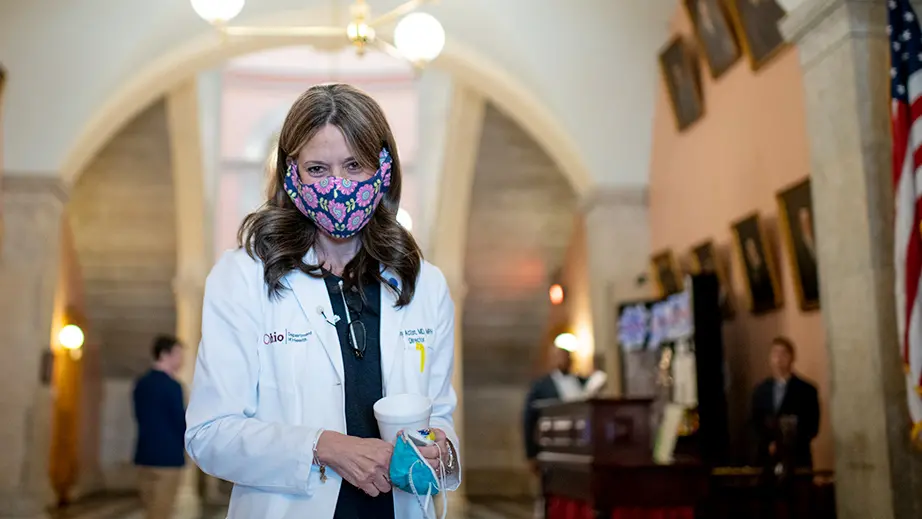
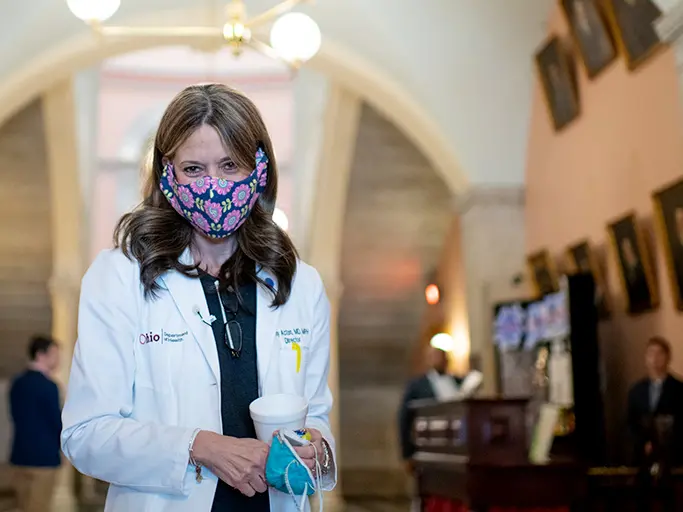
A trusted pathfinder
When your enemy is a pandemic, you want a smart, steadfast leader on your side. Amy Acton has been that beacon for Ohioans — first as director of the Ohio Department of Health and now as chief health advisor to the Ohio Governor’s Office — just as she was for her students in Ohio State’s College of Public Health.
The small moment is easily lost in all the bleariness, but it served as a glimmer of light in mid-March when the fog of fear and uncertainty stemming from COVID-19 began to change life as we knew it.
Dr. Amy Acton ’96 MPH stood behind a wooden lectern in the Ohio Statehouse, clad in her crisp, white physician’s coat and flanked by more traditional and recognizable power in Gov. Mike DeWine and Lt. Gov. Jon Husted. She looked directly into the camera livestreaming the news conference to rattled Ohioans, prepared to explain the worldwide pandemic that had crept across our border — and how we could best respond.
“I want to walk you behind the veil of what has been happening with all of this,” Acton told us.
She wanted to walk with us. Be with us. Guide us.
Acton’s few words embody the partnership she has ignited as director of the Ohio Department of Health in an unprecedented time of need. In the weeks and months that followed, she offered that reassurance each day, distilling weighty medical and public health concepts with empathy and straight talk to create a common understanding, a cause to galvanize the Buckeye State. The Ohio State University Alumni Association has recognized her outsized impact by naming her the 2020 Alumni Medalist, the association’s highest honor.
Now, Acton remains with us amid our grief and lingering anxiety, still holding a lamp on the hazy, challenging path forward.
“She’s given us someone to rally with and rally around as she stands and fights this head-on every day,” says Anton Johnson ’14, ’16 MHA, manager of operations for the cardiac imaging labs at OhioHealth Riverside Methodist Hospital in Columbus.
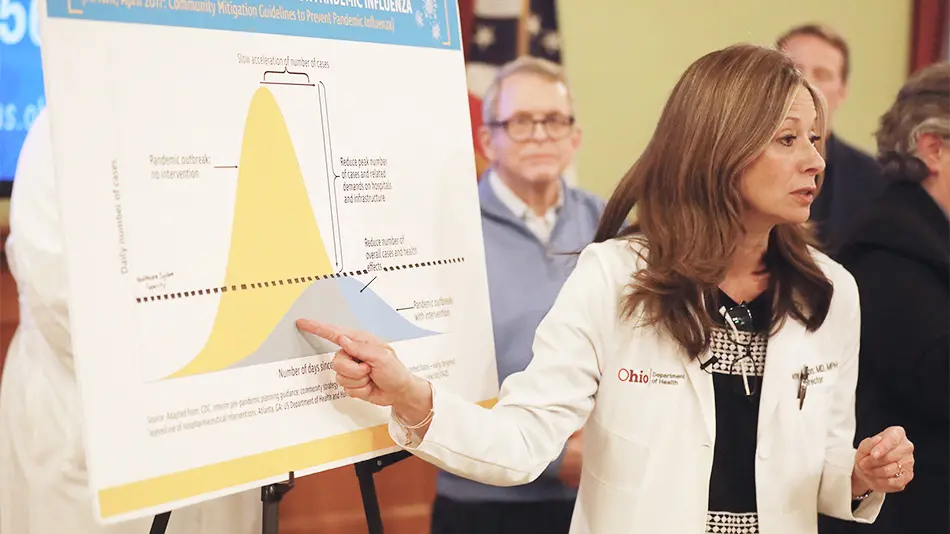
Walking through efforts to “flatten the curve” of coronavirus cases in the state, Acton is calm and reassuring in her communications, giving Ohioans solace in the midst of uncertainty. Doral Chenoweth III, courtesy of The Columbus Dispatch
Acton gained visibility across Ohio in the early days of the crisis as DeWine voiced his trust in her counsel on how best to suppress the virus. She earned a time slot at the governor’s daily afternoon news briefings, and he vehemently supported her stay-at-home order for Ohio. The two leaders relied on science to guide them in difficult decisions, ones they knew would save lives but place the state’s economy in jeopardy.
Residents generally took heed, practicing physical distance and other safety measures. The collective efforts led to a more gradual rise in coronavirus cases in Ohio than some other states and gained attention nationally as an early model for a sound statewide response.
“Amy has that background, that understanding, that rootedness — so when she is speaking to us, she is supporting us,” says Dr. Teresa Long, special advisor for community engagement and partnership in Ohio State’s College of Public Health.
“You feel her commitment and her belief that we can do this. Her determination is super powerful. She’s asking us to step forward to do our part, and it’s inspiring. This is about all of us being in this together.”
While Acton leads us into an unknown future, witnessing her leadership in this crisis has been a familiar experience for some Buckeyes.
“When I watch her every day,” Johnson says, “I kind of feel like I’m sitting in her Intro to Public Health class again.”
‘She was really invested in your life’
Details matter to Acton, and evidence is in the papers she sometimes clutches while addressing Ohioans about COVID-19.
Look closely and you’ll notice that her notes are typed, with certain passages highlighted with a yellow marker. A few hand-scribbled lines inhabit the margins. They are the notes of a prepared, keen-eyed teacher, the same one who taught off and on for 17 years at Ohio State, including as a full-time assistant professor of practice from 2012 to 2016. Acton glossed over nothing.
“She took the time to really read your papers and give great feedback,” says Johnson, who took two of Acton’s classes while pursuing his master’s in public health.
Acton views public health as a broad topic, the sum of many parts. All issues tie together in importance. She approached teaching on the same holistic terms. There were more than 100 students in her Intro to Public Health class, but she made certain to meet individually with each of them during the semester.
“It was shocking that she’d do that because it was such a big class,” says Celia Wright ’15. “What was most compelling to us all is that she had this attentiveness and interest in you as a person. She was really invested in your life.”
College of Public Health leaders recognized those same attributes in Acton, awarding her the college’s Excellence in Teaching Award in 2014–15. Her former students are reminded why when they hear her calmly relay precise news and guidance about the current pandemic.
“The way she speaks now is the way she taught,” says Casey Gayheart Smith ’15. “She has a passion for the topic, a passion for putting others before herself and a passion for helping others navigate public health crises. It’s in her tone, the way she conveys her message. She’s educating us without us realizing we’re getting educated.”
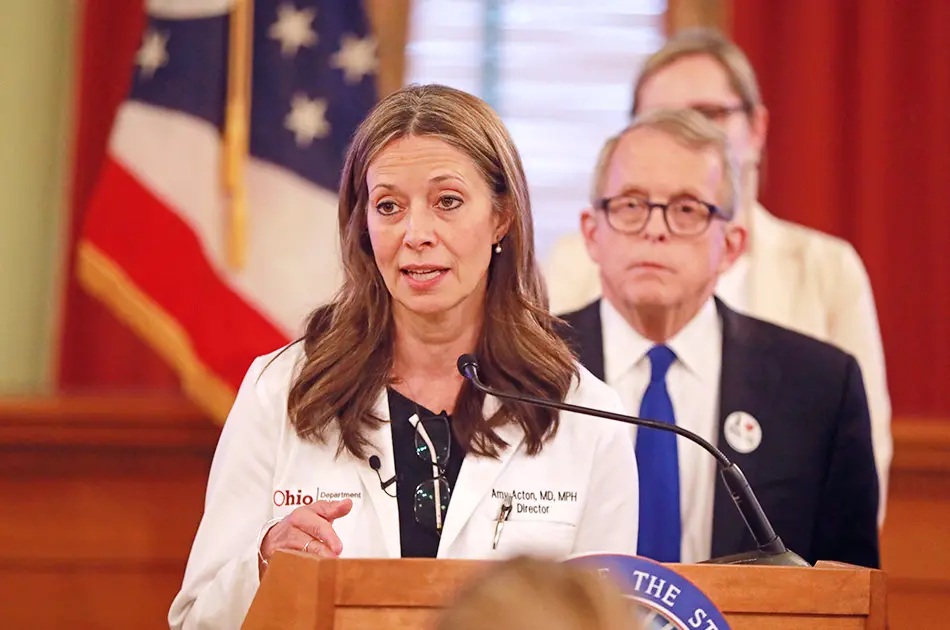
Acton answers reporters’ questions during a briefing. DeWine (background) says Acton’s commitment and connections with other experts have been instrumental in Ohio’s coronavirus response. Doral Chenoweth III, courtesy of The Columbus Dispatch
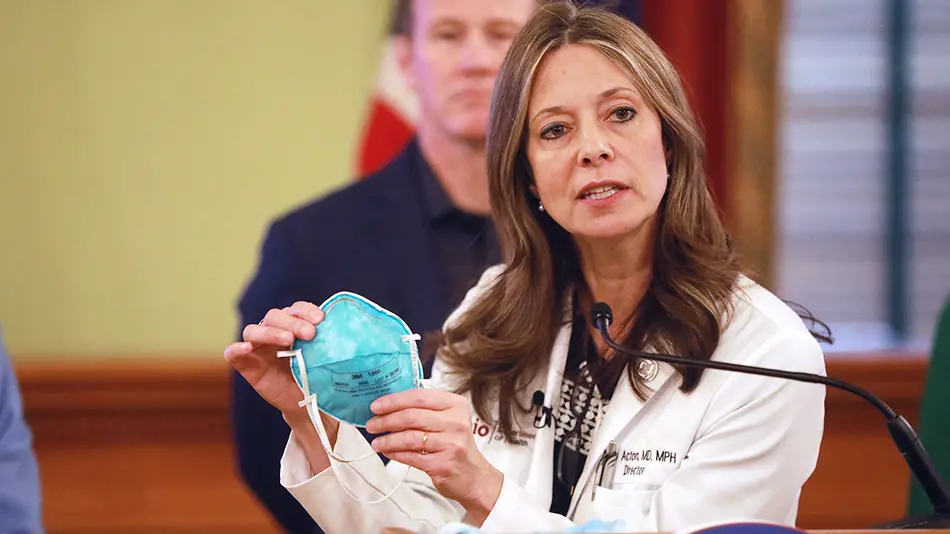
Acton describes how wearing a mask and physical distancing reduce COVID‑19’s spread. She and Lt. Gov. Jon Husted (background) have shared the floor at Gov. Mike DeWine’s daily news briefings. Doral Chenoweth III, courtesy of The Columbus Dispatch
Acton’s passion and empathy didn’t lead her to shy away from the grit of truth during her time as a professor. Teaching public health helped prepare her to speak the hard facts about COVID-19 in a way that’s still reassuring.
“I remember in class that Dr. Acton would communicate to us the harsh realities of the world,” says Wright, associate strategy officer at Open Society Foundations in New York City. “But she did so in this way that had deep impact. You could just see how she cared to her core. She’s pure compassion.
“She’s a happy, nice, fun person, but when she’s talking about public health, you can just see how serious it is to her. At the same time, you see the knowledge and hopefulness. She communicates in such a distinct way that captures severity while also treading a path forward.”
Severity and hardship aren’t strangers to Acton. Raised in Youngstown, Ohio, she was 3 when her parents divorced and her mother took custody of her and her brother. She lived in 18 different places in a 12-year period, including in a tent one winter, before eventually going to stay with her dad and his relatives.
Although Acton didn’t speak to her students in detail about her personal hurdles, they understood she knew of what she taught. She radiated toughness and authority right along with humanity.
“When I first had her as a professor,” Johnson says, “even though I was a young college male and African American, I still felt like I could relate to Dr. Acton and that she understood the challenges that so many disadvantaged people face.”
Now, everyone faces the challenge of COVID-19.
Acton understands the scope and the specifics. She is working to pave a way forward for the entire state, just as she did for each of her students.
“We saw all these qualities in the classroom,” Wright says. “This has been like a cosmic nod to say, yes, she really was as great as we thought she was.”
A resilient, strong path forward
Ohioans encounter Acton everywhere: on T-shirts and coffee mugs, in songs and videos, and in other tributes to her candor that cuts through so much confusion.
The attention, Acton says, makes her uncomfortable. She’s quick to pass credit to all Ohioans — from the governor to individual citizens — and she gets emotional when praising the 1,100 employees of the Ohio Department of Health, and every doctor, nurse and health care worker on the pandemic’s frontlines.
A physician since 1994, Acton acknowledges those medical partners by wearing her white coat at news briefings. She calls the jacket a symbol for them, but it’s also a reminder of the expertise serving as her bedrock.
“It’s important that she’s basing recommendations on science,” says Amy Ferketich, an Ohio State professor of epidemiology and former colleague of Acton. “She’s really listening to the Centers for Disease Control and Prevention recommendations and other scientific experts and using science, public health practices and standards to make decisions.”
Acton delivers that complex science to us in an easy-to-open package.
“She’s not talking in high-level medical terminology,” says Gayheart Smith of the Dayton and Montgomery County health department. “You feel as though you’re hearing from your mom or a trusted family member.
“She continues to reiterate through her messages that she very much understands that we’re all living in this hard, unprecedented time, but that she’s here for us and that we’ve got to be there for each other.”
Much remains uncertain about COVID-19 and our lives. Our way is still shrouded in fog. But the Buckeye in the white medical coat — with her confident and kindly manner — sees light ahead for us.
“Together,” Acton tells Ohioans, “we’ll build a resilient, strong path forward.”
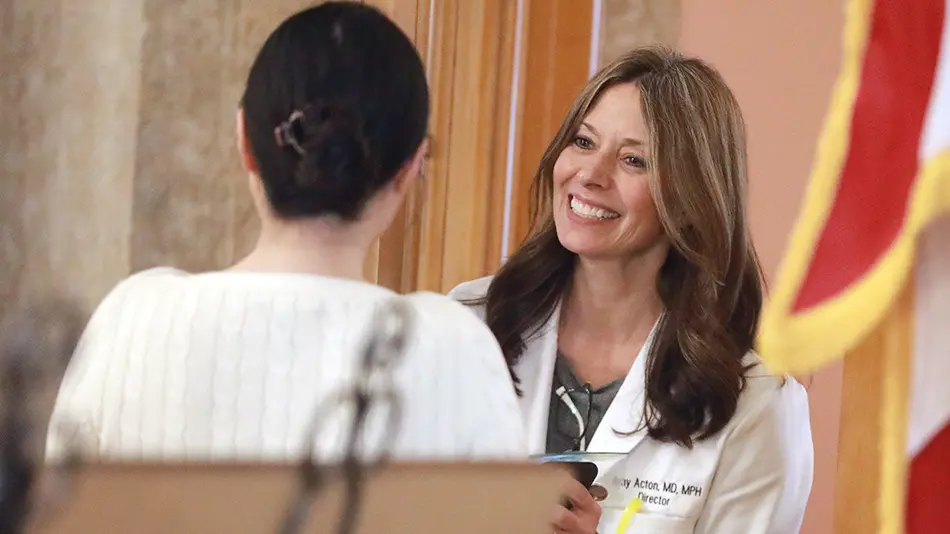
Acton accepts a well-wisher’s gift presented to her by Yibo Shao ’11, ’16 MAE, a member of Acton’s staff.
Acton lit the way for her students
Anton Johnson ’14, ’16 MHA planned to be a doctor. Then, during his junior year at Ohio State, he enrolled in an Intro to Public Health class taught by Dr. Amy Acton ’96 MPH. She changed his understanding of health care.
“I didn’t know too much about what public health was and what it meant,” he says. “Dr. Acton showed me what that world was about — how everything besides medicine also impacts people’s health.”
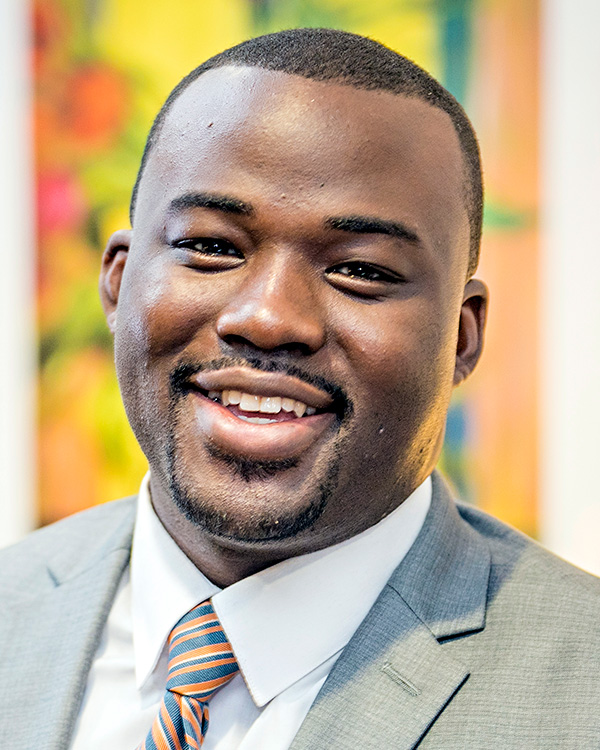
As manager of operations for the cardiac imaging labs at OhioHealth Riverside Methodist Hospital in Columbus, Johnson’s role is wide ranging. He helps ensure patients receive safe, quality care and have a positive hospital experience while also tending to department finances and personnel matters.
“Dr. Acton certainly shaped what I do now and how I look at what I do now,” Johnson says. “She impacted so many students at Ohio State.”
Acton had similar influence on Casey Gayheart Smith ’15, project manager for the Community Overdose Action Team at the Dayton and Montgomery County health department.
“She opened my eyes, started my love for public health, and is the reason I chose the field I’m in today,” Smith says. “Dr. Acton made me understand how much social determinants determine whether one ends up in medical care or not.”
Ceila Wright ’15 also credits Acton for a career choice that led to her current role as associate strategy officer at Open Society Foundations in New York City.
“I think a lot of people trace their decision to major in public health to Dr. Acton’s influence,” Wright says. “Everyone who is around her wants to be like her.”
